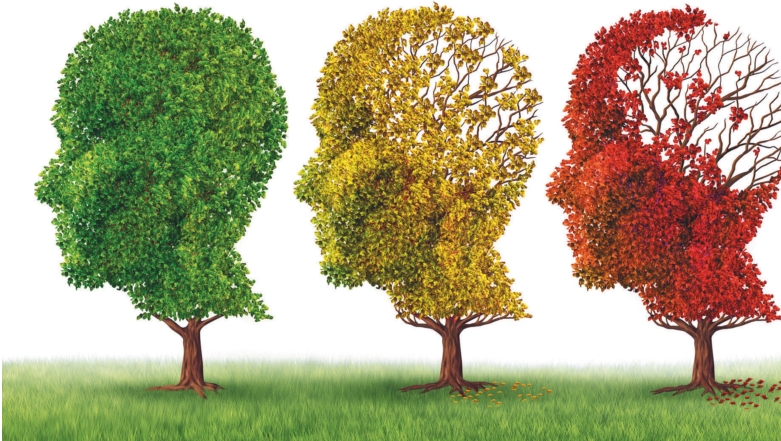Preventing Dementia

What can we do now?
As with many disease processes, we know that prevention is key. Even with dementia or cognitive decline, there are many things we can do throughout our life span, no matter when we start, that can have a positive impact on our cognitive and memory health. Currently, many new drugs are coming to market that may be the start of how we medically treat or cure dementia. Drugs such as lecanemab (Leqembi) for mild Alzheimer’s type are currently available and showing good prognosis in patients with mild cognitive impairment due to Alzheimer’s disease. However, how fast these drugs are rolled out and their availability are yet to be seen; therefore, we need to continue to be focused on making lifestyle changes to reduce our risk for Alzheimer’s disease and other dementias.
Where do we start? The National Alzheimer’s Association has identified six areas of concentration to reduce your risk of Alzheimer’s disease and other dementias: physical activity, eating healthy, smoking cessation, drinking less alcohol, staying mentally and socially active, and taking control of your health.
Physical Activity: Doing physical activity regularly is one of the best ways to reduce your risk of dementia. If you are not in a regular physical exercise routine, start small and build up gradually. It is important to include both strength-building exercises (weight training) and aerobic activity (getting your heart rate up) in your exercise routine. Moderate aerobic activity (MAA) is good for your heart, lungs and blood circulation and, in return, is good for your brain health. MAA is any type of exercise that makes you breathe faster and sweat. The American Heart Association recommends 150 minutes of MAA a week. Types of MAA include taking a brisk walk, heavy house cleaning (vacuuming, mopping, washing windows), recreational cycling, pickleball, water aerobics and dancing (ballroom or social). It can be as simple as parking farther away from your destination and walking or taking the stairs instead of using the elevator. The American Heart Association also recommends muscle-strengthening activity at least twice weekly with weights, resistance bands or using your body weight as resistance. Examples include bicep curls/triceps extension with hand weights, hip abduction exercises with resistance bands and/or doing squats to a chair. Other very simple strengthening exercises that don’t require any equipment are bridging exercises in bed, wall slides, wall push-ups and planks. Just think to yourself, “Move more, sit less.” Get up and move throughout the day. Any activity is better than none.
Eating Healthy: No addition of any one food will have a dramatic impact on dementia by itself; however, eating a range of different foods in the right proportions is what makes a difference. Evidence shows a diet rich in fruits, vegetables and whole grains and low in red meat and sugar could help reduce dementia risks. This type of diet is referred to as a Mediterranean diet in the literature. Examples of foods to include in your diet are beans, peas, nuts, fish (particularly oily types like salmon), wholegrain bread and pasta, and olive oil. Foods to limit in your diet include beef and lamb, processed meats like bacon and sausage, fried foods, high-fat foods, solid fats like butter, and sugary foods such as pastries and sweets.
Don’t smoke: Smoking cessation is a must! Smoking harms the circulation of blood around the body, particularly the vessels in the brain. It is never too late to quit, but the earlier, the better. A recent review of 37 research studies found that current smokers were 30% more likely to develop dementia in general and 40% more likely to develop Alzheimer’s disease.
Drink less alcohol: Too much alcohol increases your risk of developing dementia. It is recommended to drink no more than 14 units of alcohol a week and to try not to drink too many units in one singular setting. Spread your 14 units out over the week’s timespan. Conversion examples are an eight-ounce glass of wine is equal to three units, a can of beer or cider is equal to two units, and one ounce of spirits like gin, vodka or rum is equal to one unit.
Stay mentally and socially active: Engaging in mental and social activities daily helps to provide neuroprotection to your brain. Find activities that you enjoy and challenge your brain. Learn something new, like a new language, or try a detail-oriented hobby that requires focus. Challenge your brain to think by doing crossword puzzles, joining a book club or visiting museums regularly. Get involved in groups that are interested in the same activities or hobbies you are. Social activities are important as well. Actively listening to and communicating with others stimulates brain activity and is important in preserving brain function.
Take control of your health: Recognize as we age, we are more likely to develop health conditions like high blood pressure or diabetes. These diseases can increase the risk of getting dementia. It is important to catch these health conditions early and treat them appropriately, meaning it is also essential to have regular medical wellness check-ups yearly. Other examples of taking care of your health include getting more sleep and having your hearing checked. Sleep is important to mental well-being. Seek intervention if you have sleep apnea. Hearing loss may increase your risk for dementia. Managing hearing loss works best when you start doing it early on. Your health should be important to you, so take control!
It is never too late to start modifying your behaviors to have a positive impact on reducing the risks of developing dementia. Start small.
Think about changing one behavior at a time and then try stacking those behavior changes over time. The key is to just start.
Suzanne Tinsley is an associate professor of physical therapy at LSU Health Shreveport and is a board-certified specialist in neurologic physical therapy.
